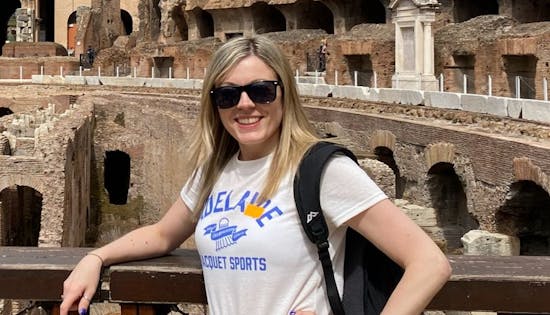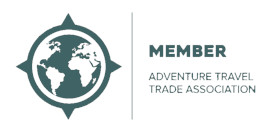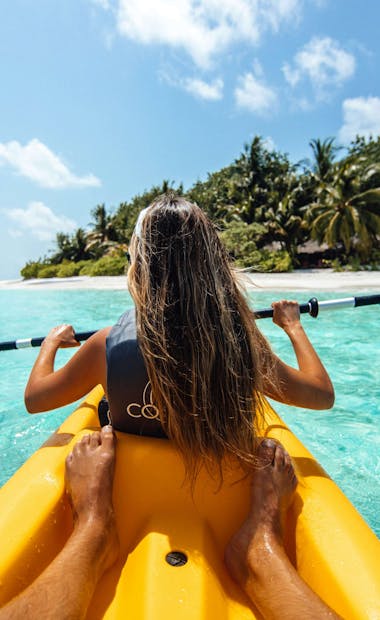South Korea Tours
Visit the land of ancient and modern, traditional temples and tasty street food
Popular tours
- Save1%
 View Tour
View TourThe South Korea Experience - 13 Days
- Seoul to Jeju
- Age group: 18 - 39
- Max group size: 22
Was:£2,093From£2,073 - Save2%
 View Tour
View Tour12-Day South Korea Tour: Seoul, DMZ, Sokcho, Gyeongju, Busan, and Jeju
- Seoul to Jeju
- Age group: 18 - 55
- Max group size: 20
Was:£1,849From£1,821 - Save1%
 View Tour
View TourSouth Korea Tour - 10 Days
- Seoul to Busan
- Age group: 18 - 39
- Max group size: 22
Was:£1,674From£1,657 - Save1%
 View Tour
View Tour10-Day South Korea Premium Tour: Seoul, Gyeongju, Busan, and Jeju
- Seoul to Seoul
- Age group: 18 - 75
- Max group size: 16
Was:£2,848From£2,806 - Save1%
 View Tour
View Tour9-Day South Korea Family Tour: Seoul, DMZ, Gyeongju, and Busan
- Seoul to Seoul
- Age group: 5 - 75
- Max group size: 16
Was:£2,148From£2,116 - Save16%
 View Tour
View TourBest of South Korea - 8 Days
- Seoul to Seoul
- Age group: 12 - 100
- Max group size: 16
Was:£2,199From£1,850
South Korea Tours
Welcome to South Korea: Land of Rich Traditions and Modern Wonders!
Embark on an unforgettable journey to South Korea, a captivating destination that seamlessly blends ancient traditions with cutting-edge technology. With our meticulously crafted South Korea tours, you'll discover a nation brimming with cultural treasures, breathtaking landscapes, and a vibrant, dynamic spirit. Get ready to immerse yourself in the wonders of this captivating country, where every corner unveils a new adventure.
South Korea offers a plethora of experiences for all kinds of travelers. From bustling metropolises to serene countryside, this diverse nation has it all. Seoul, the dynamic capital, is a captivating blend of ancient palaces, futuristic skyscrapers, and bustling markets. Explore the grandeur of Gyeongbokgung Palace, stroll along the fashionable streets of Gangnam, and indulge in mouthwatering street food at vibrant markets like Myeongdong.
Beyond the urban landscape, South Korea's natural beauty will leave you in awe. Discover the enchanting island of Jeju, a UNESCO World Heritage site, renowned for its stunning volcanic landscapes, pristine beaches, and lush countryside. Hike through Seoraksan National Park, where towering peaks, dense forests, and vibrant autumn colors create a mesmerizing spectacle. For an extraordinary cultural experience, visit the picturesque village of Bukchon Hanok, where traditional hanok houses offer a glimpse into the country's rich heritage.
Delve into South Korea's rich history and spirituality by visiting ancient temples and royal tombs. Explore the serene beauty of Bulguksa Temple in Gyeongju, an architectural masterpiece dating back to the 8th century. Experience the tranquility of traditional Korean tea ceremonies and discover the art of meditation at the tranquil temple of Beomeosa.
For the food enthusiasts, South Korea offers an unrivaled culinary adventure. Indulge in mouthwatering delights like bibimbap, bulgogi, and kimchi, while sipping on traditional rice wine, makgeolli. Venture into local markets and food stalls, where the tantalizing aromas and vibrant colors will tempt your taste buds.
With South Korea's efficient transportation system, you can effortlessly explore the country's diverse regions. Whether you're traversing the modern high-speed KTX trains or navigating the intricate subway networks, getting around is a breeze, allowing you to make the most of your South Korea holidays.
We curate South Korea tours that cater to every traveler's preferences. Whether you're seeking an immersive cultural experience, thrilling outdoor adventures, or a culinary exploration, our expertly designed itineraries ensure an unforgettable journey through this captivating country.
Let us take you on an extraordinary South Korea tour, where ancient traditions meet modern wonders, and every moment is filled with awe-inspiring discoveries. Get ready to create memories that will last a lifetime as you unravel the beauty and allure of South Korea, a destination that promises to captivate your heart and soul. Book your South Korea holiday with us today and embark on the adventure of a lifetime!
When is the best time to visit South Korea?
The best time to visit South Korea depends on your preferences and the activities you plan to engage in during your trip. South Korea experiences four distinct seasons, each offering its own unique charm. Here's a breakdown of the seasons and what they offer:
Spring (March to May): Spring is one of the best times to visit South Korea, particularly in April when the cherry blossoms are in full bloom. The weather is mild and pleasant, making it ideal for outdoor activities and exploring the beautiful parks and gardens. Spring also sees various festivals and events, such as the Jinhae Cherry Blossom Festival and the Lotus Lantern Festival.
Summer (June to August): Summers in South Korea are hot and humid, with temperatures often reaching above 30°C (86°F). This season is a popular time for beachgoers as well as outdoor activities like hiking in the mountains. It's also the time for vibrant festivals such as the Boryeong Mud Festival and the Busan International Film Festival.
Autumn (September to November): Autumn is considered another excellent time to visit South Korea. The weather is mild and comfortable, with beautiful foliage colors blanketing the landscapes. This is a great time for outdoor activities like hiking in national parks, visiting traditional villages, and enjoying the stunning autumn scenery. The annual Seoul International Fireworks Festival is also held during autumn.
Winter (December to February): Winter in South Korea can be quite cold, especially in the northern regions, with temperatures dropping below freezing. However, it's also a magical time to visit if you enjoy winter sports such as skiing or snowboarding. The country has several ski resorts, and the winter landscapes can be breathtaking. Winter also brings the Lunar New Year celebrations and ice festivals, including the famous Hwacheon Sancheoneo Ice Festival.
It's important to note that popular tourist destinations, such as Seoul and Jeju Island, can be crowded during peak seasons, such as spring and autumn. If you prefer fewer crowds and lower accommodation rates, consider visiting during the shoulder seasons (March to May or September to November).
Ultimately, the best time to visit South Korea depends on your interests, tolerance for weather conditions, and personal preferences. Consider what activities and experiences you desire, and plan your visit accordingly to make the most of your time in this fascinating country.
Will I need a visa to travel to South Korea?
Yes, most travelers will require a visa to enter South Korea. However, visa requirements vary depending on your nationality and the purpose and duration of your visit. Here are some general guidelines:
Visa Exemption: Citizens of certain countries are eligible for visa-free entry or visa exemption for a specified period. For example, citizens of the United States, Canada, the United Kingdom, Australia, and many European countries can enter South Korea for tourism or business purposes without a visa for up to 90 days. However, it's important to check the specific requirements and conditions for your country of citizenship, as they may differ.
Visa on Arrival: Some nationalities that do not qualify for visa exemption can obtain a visa on arrival at certain airports and seaports in South Korea. This type of visa usually allows a stay of up to 30 days. However, it's advisable to check the eligibility and requirements for visa on arrival before your trip.
Visa Application: If you do not qualify for visa exemption or visa on arrival, you will need to apply for a visa in advance through the South Korean embassy or consulate in your home country. The specific visa category will depend on the purpose of your visit, such as tourism, business, or work.
When applying for a visa, you will generally need to provide the following documents:
- Valid passport with a minimum of six months validity beyond your intended stay
- Completed visa application form
- Recent passport-sized photographs
- Proof of travel itinerary, including flight tickets and accommodation details
- Proof of sufficient funds to cover your stay in South Korea
- Proof of medical travel insurance
- Additional documents as required by the embassy or consulate
It's important to note that visa requirements can change, so it's advisable to check with the nearest South Korean embassy or consulate in your country or consult a reputable visa service for the most up-to-date and accurate information.
Remember to apply for your visa well in advance of your intended travel dates to allow for processing time. Having the necessary visa will ensure a smooth entry into South Korea, allowing you to fully enjoy your South Korea tour or holiday.
What are the must see destinations in South Korea
South Korea offers a captivating blend of ancient traditions and modern marvels, with an array of must-see destinations that cater to all types of travelers. From bustling cities to serene countryside, here are some of the top highlights to explore during your visit:
Seoul: As the vibrant capital of South Korea, Seoul is a city that seamlessly blends modernity with rich cultural heritage. Explore historic sites like Gyeongbokgung Palace, Changdeokgung Palace, and Jongmyo Shrine. Wander through the vibrant streets of Myeongdong, explore the trendy district of Gangnam, and visit the iconic N Seoul Tower for breathtaking panoramic views.
Jeju Island: Known as the "Hawaii of South Korea," Jeju Island is a natural wonderland brimming with stunning landscapes. Visit Seongsan Ilchulbong Peak, a UNESCO World Heritage site with a breathtaking crater, and hike along the scenic trails of Hallasan, South Korea's highest mountain. Explore the picturesque waterfalls, volcanic rock formations, and beautiful beaches that make Jeju Island a paradise for nature lovers.
Gyeongju: Immerse yourself in the rich history of Gyeongju, often referred to as the "museum without walls." Discover the UNESCO World Heritage sites of Bulguksa Temple and Seokguram Grotto, which showcase remarkable Buddhist architecture. Explore the ancient tombs at the Daereungwon Tomb Complex and visit the Gyeongju National Museum to learn about the region's cultural heritage.
Busan: Experience the vibrant coastal city of Busan, known for its beautiful beaches, bustling markets, and delicious seafood. Relax on the sandy shores of Haeundae Beach, explore the colorful Gamcheon Culture Village, and visit the renowned Jagalchi Fish Market. Don't miss the breathtaking views from the Busan Tower or a visit to the historic Beomeosa Temple.
DMZ and JSA: Take a unique tour to the Demilitarized Zone (DMZ) and Joint Security Area (JSA) to witness the division between North and South Korea. Explore historical sites like the Third Infiltration Tunnel, Dora Observatory, and the iconic Bridge of No Return, gaining insights into the complex history and ongoing tensions of the Korean Peninsula.
Andong: Experience traditional Korean culture in the charming city of Andong. Visit the Andong Hahoe Folk Village, a UNESCO World Heritage site, where you can immerse yourself in the traditional way of life and witness traditional mask dances. Explore the historic Dosan Seowon Confucian Academy and the picturesque Woryeonggyo Bridge.
Suwon: Discover the fascinating Hwaseong Fortress in Suwon, a UNESCO World Heritage site and an architectural masterpiece. Explore the well-preserved fortress walls, gates, and pavilions, and enjoy cultural performances at the Hwaseong Haenggung Palace.
These are just a few highlights among many incredible destinations in South Korea. From bustling cities to serene natural wonders, each region offers its own unique charm and attractions. Whether you're fascinated by history, captivated by nature, or seeking modern urban experiences, South Korea promises a diverse and enriching travel experience.
What is the local currency in South Korea and can I use credit cards?
The local currency of South Korea is the South Korean Won (KRW). When traveling to South Korea, it is advisable to carry some local currency for small expenses, such as transportation, street food, and shopping at local markets.
Credit cards are widely accepted in South Korea, especially in major cities, tourist areas, and larger establishments. Visa and Mastercard are the most commonly accepted cards, while American Express and Discover cards may be accepted in some places, but their acceptance is less widespread.
In South Korea, you can use credit cards for various transactions, including shopping, dining at restaurants, and accommodations. Additionally, many ATMs in South Korea accept international credit and debit cards, allowing you to withdraw cash in the local currency. It's always a good idea to inform your bank or credit card company about your travel plans to ensure uninterrupted use of your cards and to inquire about any foreign transaction fees or currency conversion charges that may apply.
Overall, credit cards are a convenient and widely accepted form of payment in South Korea, but it is still advisable to carry some cash, especially for smaller establishments or when venturing to more remote areas.
Is South Korea a good destination for solo travellers?
Absolutely! South Korea is a fantastic destination for solo travelers seeking adventure, cultural exploration, and unforgettable experiences. Here are some reasons why South Korea is an ideal destination for solo travelers:
Safety: South Korea is known for its overall safety and low crime rates, making it a welcoming destination for solo travelers. You can explore cities, visit attractions, and navigate public transportation with peace of mind.
Well-connected transportation: South Korea has a reliable and efficient transportation system, including a comprehensive subway network, high-speed trains, and buses. This makes it easy for solo travelers to navigate the country and reach various destinations with ease.
English proficiency: While English may not be widely spoken in all parts of the country, you can find English signage, menus, and many locals who can communicate in English, especially in major cities and popular tourist areas. This can help solo travelers feel more comfortable and make it easier to seek assistance if needed.
Vibrant city life: South Korea's cities, such as Seoul and Busan, offer an exciting blend of modernity and traditional charm. From shopping districts to vibrant nightlife, cultural festivals, and delicious street food, solo travelers can immerse themselves in the dynamic urban atmosphere and discover the unique fusion of tradition and innovation.
Cultural experiences: Solo travelers can delve into South Korea's rich cultural heritage through visits to historic palaces, temples, and traditional villages. Participate in temple stays, witness traditional performances, and indulge in Korean cuisine, known for its diverse flavors and unique dining experiences.
Outdoor adventures: South Korea's diverse landscapes provide ample opportunities for solo travelers to engage in outdoor activities. Hike scenic mountains like Seoraksan, explore national parks, relax on picturesque beaches, or try your hand at water sports along the coast. Outdoor enthusiasts will find plenty of opportunities to satisfy their sense of adventure.
Welcoming locals: South Koreans are known for their warm hospitality and friendly nature. Solo travelers can expect to encounter helpful locals who are often willing to offer assistance or strike up a conversation, adding a sense of warmth and connection during their journey.
With its blend of rich history, modern cities, stunning landscapes, and welcoming culture, South Korea offers an excellent backdrop for solo travelers to create unforgettable memories and embark on a personal journey of discovery. So pack your bags, embrace the spirit of adventure, and get ready to explore the wonders of South Korea on your own terms.
Is South Korea a safe destination?
Yes, South Korea is generally considered a safe destination for travelers. The country has a low crime rate and is known for its overall safety. Travelers can explore cities, visit attractions, and navigate public transportation with a sense of security. However, as with any travel destination, it's important to exercise basic precautions and remain aware of your surroundings.
Here are a few tips to ensure a safe and enjoyable trip to South Korea:
Be cautious with your belongings: Keep an eye on your personal belongings, especially in crowded areas, tourist sites, and public transportation. Use common sense and avoid displaying valuable items openly.
Use reputable transportation options: South Korea has a reliable and well-connected transportation system. Opt for licensed taxis, official ride-hailing services, or public transportation like subways and buses. Be cautious if using unofficial taxis or accepting unsolicited rides.
Follow local laws and regulations: Familiarize yourself with local laws and regulations in South Korea and ensure that you adhere to them during your visit. Respect local customs, traditions, and cultural sensitivities.
Stay informed about current events: Stay updated on any travel advisories or alerts issued by your country's government or relevant authorities. It's advisable to register with your embassy or consulate before traveling to receive important information or assistance if needed.
Take care of your personal safety: As with any destination, it's important to exercise common sense and take precautions for personal safety. Stick to well-lit and populated areas, especially at night. Inform someone of your travel plans and share your itinerary if possible.
Be cautious with alcohol consumption: If consuming alcohol, do so responsibly and be mindful of your surroundings. Like in any country, excessive alcohol consumption can impair judgment and increase vulnerability.
While South Korea is generally safe, it's always wise to stay informed, exercise caution, and take necessary precautions during your travels. By being aware of your surroundings and following common-sense guidelines, you can enjoy a safe and memorable trip to South Korea.
Will I require any vaccinations to travel to South Korea?
The specific vaccinations required for travel to South Korea may vary depending on your home country, previous immunizations, and personal health history. It is best to consult with a healthcare professional or travel health clinic to receive the most accurate and up-to-date information based on your individual circumstances.
That being said, there are typically no mandatory vaccinations for travelers entering South Korea. However, it is recommended to ensure that your routine vaccinations are up to date, including vaccinations for measles, mumps, rubella, diphtheria, tetanus, pertussis, and influenza.
It may also be advisable to consider vaccinations or preventive measures for certain diseases based on the time of year, your specific travel itinerary, and any potential health risks. This can include vaccinations for hepatitis A and B, typhoid, Japanese encephalitis, and rabies, among others.
Again, it is important to consult with a healthcare professional or travel health clinic at least 4 to 6 weeks before your trip to South Korea. They will have access to the most current information on recommended vaccinations and can provide personalized advice based on your individual health status and travel plans.
Additionally, it is always a good idea to practice general hygiene measures, such as regular handwashing, to reduce the risk of illness while traveling.
How does the rooming work on tours?
Small group tours in South Korea typically involve a set itinerary where you travel with a group of fellow travellers and a tour leader/guide. Accommodation arrangements vary depending on the specific tour you choose. Here are some common aspects of rooming arrangements on small group tours:
Shared Rooms: In order to promote camaraderie and facilitate interaction among group members, most tours arrange shared accommodation. This means you will be paired with another member of the same gender from the group to share a room. Roommates may sometimes change periodically throughout the tour.
Single Supplement: If you prefer to have your own room and privacy, you may have the option to pay a single supplement fee. This additional fee allows you to have your own room for the duration of the tour. However, please note that single supplements can vary in cost and availability.
Roommate Matching: Tour operators usually offer roommate matching services, where they try to pair you with a suitable roommate based on your preferences, such as age range. This can help ensure compatibility and a more enjoyable experience for all participants.
Rooming Preferences: When booking your small group tour, it's important to communicate your rooming preferences to the tour operator. If you have specific requirements or preferences, such as sharing with a friend or a specific roommate request, it's advisable to inform the tour operator during the booking process.
It's important to carefully read the tour details and inclusions provided by the tour operator to understand their specific rooming policies. If having your own room is a priority, make sure to inquire about the availability of single supplements and any associated costs before booking your tour.
Keep in mind that while sharing a room with a fellow traveller can be a great way to meet new people and build connections, having your own room provides more privacy and flexibility. Consider your preferences and the dynamics of the tour when deciding whether to opt for a shared room or pay for a single supplement.
Remember to communicate your needs and preferences clearly with the tour operator during the booking process to ensure a comfortable and enjoyable accommodation experience on your small group tour in South Korea.
What is the food like in South Korea?
South Korean cuisine is a delightful culinary journey that combines bold flavors, diverse ingredients, and a rich culinary heritage. Known for its vibrant and varied dishes, South Korean food offers a unique blend of flavors, textures, and aromas. Here are some highlights of the food in South Korea:
Kimchi: Considered a staple in Korean cuisine, kimchi is a fermented side dish made from cabbage or radishes, spiced with chili pepper, garlic, and other seasonings. It adds a tangy and spicy kick to any meal and is often enjoyed with rice, soups, or as an accompaniment to various dishes.
Korean BBQ: One of the most popular dining experiences in South Korea is Korean BBQ. You can grill a variety of marinated meats, such as beef (bulgogi), pork (samgyeopsal), or chicken, right at your table. Wrap the grilled meat in lettuce leaves, add some condiments, and enjoy the delicious flavors and interactive dining experience.
Bibimbap: Bibimbap is a colorful and nutritious rice dish that consists of a bowl of steamed rice topped with various seasoned vegetables, meat (optional), and a fried egg. It is often served with gochujang, a spicy red pepper paste, which you can mix in to enhance the flavors.
Jjigae and Guk: Jjigae refers to a variety of Korean stews, typically served in a hot pot and simmered with an assortment of ingredients like tofu, vegetables, seafood, or meat. Guk, on the other hand, refers to Korean soups, which can be clear or flavored with soybean paste (doenjang) or soy sauce (ganjang). Some popular examples include kimchi jjigae, doenjang jjigae, and samgyetang (chicken ginseng soup).
Street Food: South Korea is famous for its vibrant street food scene. You can find an array of delicious snacks and quick bites while exploring markets and street stalls. Try favorites like tteokbokki (spicy rice cakes), gimbap (rice and seaweed rolls), hotteok (sweet pancake filled with syrup or red bean paste), and eomuk (fish cake skewers).
Banchan: Banchan refers to an assortment of small side dishes that are served with every Korean meal. These can include kimchi, pickled vegetables, seaweed, radishes, sprouts, and more. Banchan adds variety and complements the main dishes, providing a balance of flavors and textures.
Desserts: South Korea offers a range of unique and delicious desserts. Try patbingsu, a shaved ice dessert topped with sweet red beans, fruits, and condensed milk. Also, indulge in hotteok (sweet pancake), sikhye (sweet rice punch), or rice cakes (tteok) in various flavors and forms.
South Korean cuisine is not only about the flavors but also about the communal aspect of dining. Sharing dishes, mixing flavors, and experiencing the diverse culinary offerings is an integral part of the South Korean food culture. So be prepared to savor a mix of spicy, savory, and satisfying flavors that will leave your taste buds delighted and craving for more.
Can I drink the tap water in South Korea?
In general, tap water in South Korea is considered safe to drink. The country has a well-developed infrastructure for water treatment and supply, and the tap water meets high-quality standards. The government conducts regular testing to ensure the safety of drinking water.
However, some people may prefer to drink bottled or filtered water for personal preference or if they have a sensitive stomach. Bottled water is widely available and affordable in South Korea, so you can easily purchase it if you prefer.
If you are staying in hotels or eating at reputable restaurants, they typically serve water that is safe to drink. It's always a good idea to ask the staff if you have any concerns.
If you are visiting more remote or rural areas, it may be advisable to check with the locals or your accommodations about the quality of the tap water in that specific area.
If you are unsure or have any concerns, it is best to rely on bottled water or use water purification methods such as using a water filter or boiling tap water before consuming it.
Overall, South Korea has a reliable water supply system, and tap water is generally safe to drink. However, personal preferences and individual sensitivities may vary, so it's always a good idea to consider your own needs and preferences when it comes to consuming tap water during your trip.
Are there any cultural norms in South Korea I should follow?
Yes, South Korea has its own unique cultural norms and etiquette that visitors are encouraged to respect and follow. By observing these cultural norms, you can show appreciation for the local customs and traditions. Here are some key cultural norms in South Korea:
Bowing: Bowing is a common form of greeting and showing respect in South Korea. When meeting someone, it is customary to bow slightly, with a deeper bow reserved for more formal or respectful situations. The younger person or lower-ranking individual usually initiates the bow.
Removing Shoes: It is customary to remove your shoes when entering someone's home, certain traditional establishments, and sometimes even in some restaurants and guesthouses. Look for a shoe rack or follow the lead of others.
Dining Etiquette: South Korean dining etiquette places importance on communal dining and sharing. Wait for the eldest or senior person to start eating before you begin. When receiving or passing dishes, use your right hand or both hands to show respect. It is polite to wait for others to pour your drink before you pour theirs, and when drinking alcohol, hold your cup with both hands when receiving a drink or toasting.
Etiquette in Public Spaces: Public spaces in South Korea are generally well-maintained and respected. Avoid littering and use designated trash bins. Keep your voice down in public areas, such as public transportation or cultural sites, to maintain a calm atmosphere.
Personal Space: South Koreans value personal space, so it's important to be mindful of physical boundaries. Avoid touching people, especially those you have just met, unless it is a customary handshake. Maintain an appropriate distance when conversing or interacting with others.
Tipping: Tipping is not a common practice in South Korea. It is not expected or required in restaurants, taxis, or other service establishments. Instead, excellent service is usually acknowledged by saying "thank you" or giving positive feedback.
Politeness and Respect: South Koreans value politeness and respect in their interactions. Use polite language and honorifics, especially when addressing older individuals or those in higher positions. Saying "hello" (annyeonghaseyo) and "thank you" (kamsahamnida) in Korean goes a long way in showing appreciation.
Dress Code: South Koreans tend to dress modestly and conservatively, especially in formal or traditional settings. When visiting temples or other religious sites, it is important to cover your shoulders and legs. Avoid overly revealing or casual attire in such places.
By being aware of and respecting these cultural norms, you can create a positive impression and enjoy a harmonious cultural experience during your visit to South Korea. Remember, South Koreans are generally welcoming and understanding towards visitors, so a genuine effort to show respect and appreciation will be well-received.
What should I pack for a trip to South Korea?
When packing for a trip to South Korea, it's important to consider the season, weather conditions, and the activities you plan to engage in. Here's a general packing list that can help you prepare for your trip:
- Clothing:
- Comfortable walking shoes: South Korea is known for its vibrant cities and beautiful landscapes, so comfortable shoes are essential for exploring.
- Light and breathable clothing for summer: If you're traveling during the summer months (June to August), pack lightweight and breathable clothes, such as t-shirts, shorts, dresses, and skirts.
- Layered clothing for spring and autumn: During spring (April to May) and autumn (September to November), the weather can be changeable. Pack layers like long-sleeved shirts, light sweaters, and a light jacket to adapt to temperature fluctuations.
- Warmer clothing for winter: If you're traveling during winter (December to February), pack warm clothing, including a heavy coat, sweaters, scarves, hats, and gloves.
- Rain Gear:
- Umbrella or raincoat: South Korea experiences rainfall throughout the year, so having a compact umbrella or a lightweight raincoat is recommended.
- Electronics and Adapters:
- Power adapters: South Korea uses Type C and Type F electrical outlets, so bring suitable adapters for your electronic devices.
- Portable charger: A portable charger can come in handy, especially if you'll be out and about for extended periods.
- Travel Essentials:
- Passport and copies: Carry your passport and make photocopies or digital copies for backup.
- Travel insurance documents: It's always a good idea to have your travel insurance details accessible.
- Korean phrasebook or translation app: Having some basic Korean phrases or a translation app can be helpful for communication.
- Money and cards: Bring some local currency (Korean won) and make sure to inform your bank about your travel plans to ensure your credit/debit cards work smoothly.
- Personal Items:
- Toiletries: Pack your personal toiletries, including toothbrush, toothpaste, shampoo, conditioner, and any specific personal care items you prefer.
- Medications: If you take prescription medications, ensure you have an adequate supply for the duration of your trip.
- Sunscreen and insect repellent: Protect your skin from the sun and insects, especially during outdoor activities.
- Other Items:
- Travel adapter for electronic devices.
- Daypack or backpack: Useful for carrying essentials during day trips or sightseeing.
- Travel guidebook or maps: Helpful for navigating and discovering attractions.
- Travel locks: Keep your belongings secure in your accommodation or while traveling.
- Snacks and water bottle: Carry some snacks and a refillable water bottle for convenience and hydration.
Remember to check the weather forecast for your specific travel dates and destinations in South Korea to fine-tune your packing list. It's also a good idea to pack light and leave some space for souvenirs or items you may purchase during your trip.
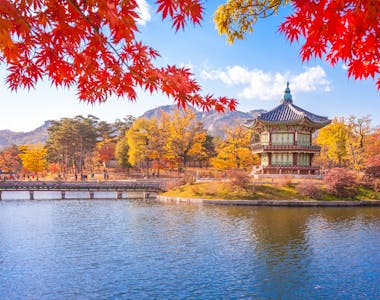
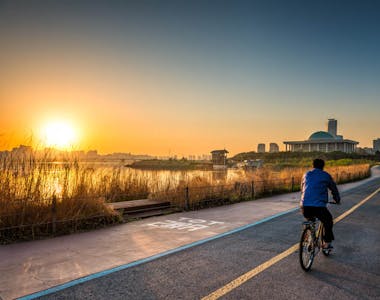
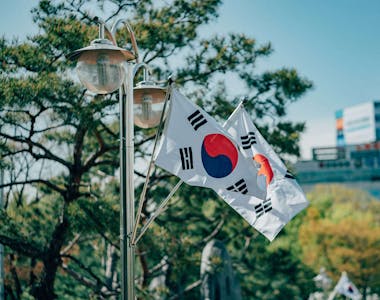
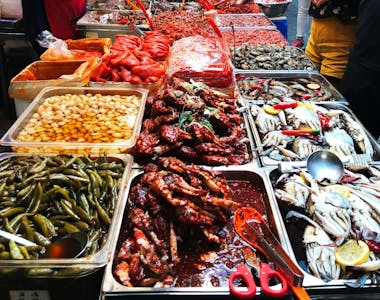
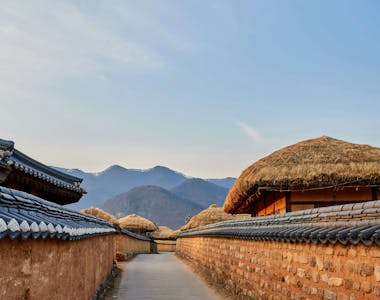
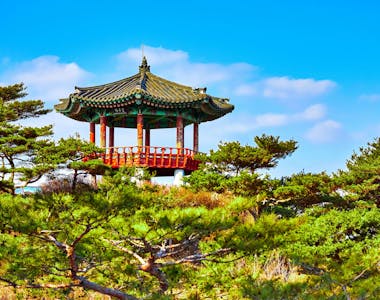
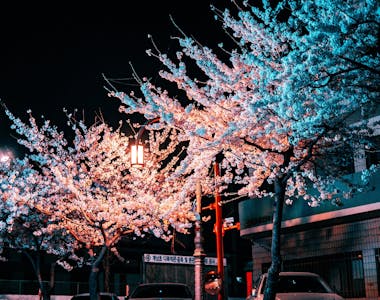
Book With Confidence
Monthly Payments
Spread the costs with no interest or additional fees
Best Price Guarantee
We won't be beaten on price. If you find this adventure at a lower price please get in touch!
Reserve now & pay later
Reserve your adventure today and pay later, free of charge
ATOL protected
Book with confidence
Hold your space today, for free
or book your trip with a deposit and then pay the rest in instalments.
Reserve your flights with us
Add flights to your booking and we'll take care of the rest. You'll get 24/7 support from our team & ATOL protection.
Speak to our experts
Call or email our expert team to find out more and help with ideas and planning.
